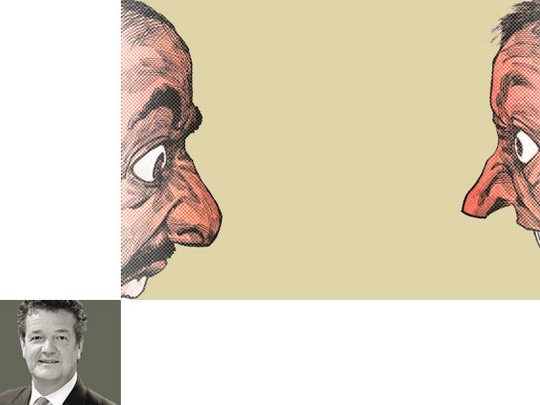
Iran and the United States are both looking for trouble over Iran's nuclear programme, and the whole of the Gulf will have to live with serious instability for all of 2012. The clashes are certain to move beyond the previously diplomatic disputes, and have already become more physical with grave danger of instability spreading.
The mischief has already started, and we have already seen the start of the inevitable chaos of governments seeking confrontation. This week, Iranian forces shot down an American RQ-170 Sentinel drone which they say was violating Iranian airspace. This was a blunt reminder to Washington that Iran has the capacity to cause endless trouble and casualties to American troops in Afghanistan and Iraq (never mind anything in Iranian airspace).
This follows last week's storming of the British Embassy in Tehran by groups backed by Ahmadinejad's rivals, Tehran Mayor Mohammad Baqer Qalibaf and Speaker Ali Larijani. No one was hurt and no embassy staff were held hostage, but the message has been given that this could easily happen next time.
A more bizarre ratcheting up of tension was achieved by the alleged assassination plot that the Americans announced in October, in which they claim that the masterminds, with Iranian government backing, sought hit-men from Mexican drug gangs to assassinate the respected Saudi ambassador in Washington. This disclosure fanned Saudi suspicion of Iran, and gave the Washington hawks another reason to seek Saudi support in their confrontation with Iran.
This kind of deliberate provocation has been going on for some years. An obvious example is the odd case of two Americans, Josh Fattal and Shane Bauer, who were imprisoned by the Iranians for two years when they were apparently hiking on the Iranian-Iraqi border.
Regardless of their bizarre choice of venue for a hiking holiday, they were not found guilty of spying, but their presence in Iranian jails was a serious distraction for American diplomats, and gave the Iranians a useful stick with which to beat them.
A similar episode happened when 15 sailors from Britain's Royal Navy were captured in ill-defined Iraqi waters by armed vessels of the Iranian Revolutionary Guards and detained for 13 days.
The sailors were released "as a gift to the British people" by President Mahmoud Ahmadinejad, giving him both two weeks of satisfactory mischief and a very useful piece of propaganda when one sailor was made to apologise for Britain's intrusion into Iranian waters.
Nationalist votes
In November 2012, US President Barack Obama faces his Republican challenger in the US presidential elections, and he cannot afford to appear weak on Iran. In Tehran, Ahmadinejad faces parliamentary elections in March during which he will need to be very tough with the US to gather nationalist votes.
In addition, in 2013, Iran has its next presidential elections, and although Ahmadinejad cannot run for another term, he will want his nominee to win, and confrontation with the US is a sure way to inflame emotions and increase support.
The Obama administration has accepted the Bush argument that Iran is active in developing a nuclear weapons programme, and all of Washington works on the assumption that Iran is moving towards owning weapons of mass destruction. The Iranian government denies this absolutely, but also refuses to allow the completely open access that would verify its claims.
In addition, the Israeli government of Benjamin Netanyahu is delighted with the present high level of suspicion between Iran, the Americans, and the Arab states in the Gulf. It is working hard to encourage this atmosphere of mutual hatred and mistrust, and it is using its high-level contacts in Washington to make sure that there is no deviation from the existing exaggerated hatred of Iran and all that it does.
Looking ahead to 2012 it is easy to see things getting worse. There could well be armed scuffles on the Afghan border, where US troops are present. Odd groups of people might be detained here and there, effectively becoming hostages in the heated confrontation that Iran wants in 2012. The US and European sanctions will have their effect, and Iran will react violently, just as the recent Iranian parliamentary debate on British reinforcement of sanctions led to the attack on the embassy.
And all this is in addition to the possibility of armed assault on Iranian nuclear facilities, as has been threatened by Israel, and welcomed by many Washington hawks. In the event of such destruction, the Iranians have already promised that they will react forcefully, seeking revenge on whatever American and other targets they decide will give them the maximum impact.
For example, Iran has the capacity to impose a blockade on the Straights of Hormuz, which would have dramatic results worldwide.
But even the most radical Washington hawk has no desire to sponsor American-backed regime change in Iran. Such an operation is well beyond its capability and would lead to failure. Therefore, by mid-2013, the next presidents of Iran and the US will be staring at each other with the legacy of a grim 2012 poisoning what little chance there will be of reconciliation.










